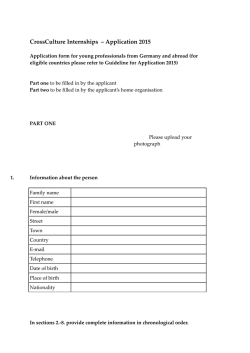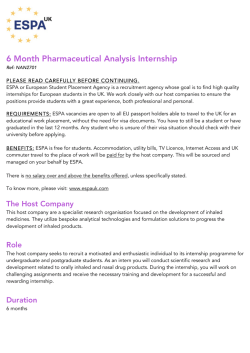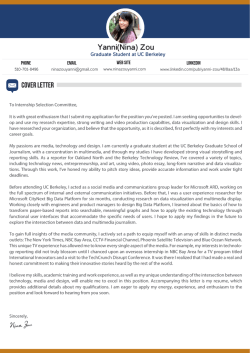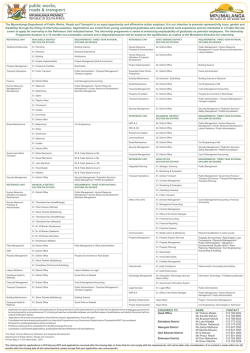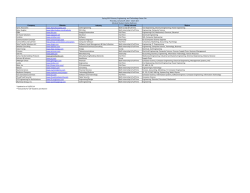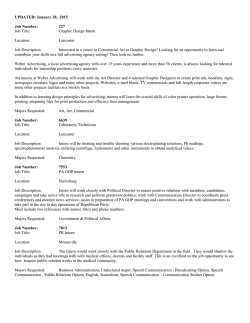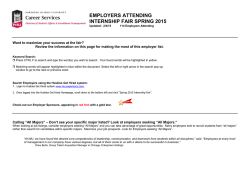
Ohio Internship General Information
General Information about an Ohio Internship in School Psychology Introduction: This information is provided to Ed.S. students who are planning to complete an Ohio Internship in School Psychology. The purpose of this document is to provide you with general information about how state-funded internships work in Ohio and what you can anticipate between now and the beginning of your internship. Choosing State for Internship Students who intend to work in Ohio following completion of the Ed.S. degree should plan to complete an internship in Ohio. Because the Ohio internship requires some additional course requirements, as well as a commitment to work in the schools of Ohio following completion of the degree, students should make this decision as early as possible in their degree program. Students who intend to work in a state other than Ohio following completion of the degree should seriously consider completing an internship in that state. Further information about out-of-state internships is available in the document General Information about an Out-of-State Internship in School Psychology. Internship Matches • Internship matches are made by KSU faculty based on the internship preferences you provide to us and our knowledge of the internship site. • Unless there is some concern about your readiness for internship or an unexpected delay in confirming an internship site for you, intern matches will be announced during your individual conference with program faculty in December. • These “matches” are considered tentative pending an interview with the proposed district. Interview with Proposed Site • Soon after receiving the information about your proposed internship site, you should make a contact with the district and arrange for an on-site interview, generally during early to mid January. The purpose of this interview is to give district personnel an opportunity to meet you and confirm that they are comfortable committing to you as an intern. 2 • During this interview, take your portfolio, and be prepared to respond to content questions (e.g., “What would you do in this situation”). In some cases, these interviews are very casual and more like a general “chit chat,” while in other instances you may be interviewing with several individuals, including personnel from human resources. • Rarely does this interview go into specifics about your employment contract (i.e., number of days, salary, benefits). Usually, that comes later and may involve an interview with different personnel. • Following this interview, you should notify the KSU faculty member who supervises internship (currently Drs. Mcloughlin and Telzrow) that you had your interview, who was present, and how it went. This signals us to contact the district and confirm that the district remains committed to you. Internship Funding • The Ohio Internship in School Psychology has been supported by the Ohio Department of Education for nearly 50 years. This arrangement allows for lots of positives and a few negatives. The biggest negative is that since this is a line item in the state budget, it must be revisited every two years. There has been strong advocacy from the school psychology and educational community for continuing this support, and it has been retained even through tough budget years. • The way that internship funding has worked in the past, districts are reimbursed a specified dollar amount for the intern. In order to be eligible to receive reimbursement, a district must be recommended by KSU, and submit an application to the ODE that identifies how the reimbursement will be spent across various budget categories (e.g., salary, retirement, worker’s compensation, travel, materials & supplies). • The dollar amount of reimbursement per intern for the previous few years has been between $27,000 and $29,000. However, this amount varies from year to year, since it depends upon two things: (a) the total line item in the state budget for the internship program, and (b) the number of interns. Salary and Benefits • Districts are asked to either pay the intern on the district’s own salary schedule, or adopt a separate, intern school psychologist salary schedule. If the district chooses the latter procedure, which nearly all do, we encourage school districts to use the state minimum teachers’ salary schedule. The annual salary for an intern with 0 years of experience on this schedule is $21,900. To our knowledge, most districts where our students intern have been able to offer this salary. However, there is no requirement that districts offer this salary amount, and the university does 3 not consider the amount of salary that a district is offering when making internship matches. • Sometimes, the district may use an Educational Service Center (ESC) as the fiscal agent for employing the intern. If your intern match information indicates that a district other than the district where you will be receiving your experience will act as fiscal agent, this means that you will actually be hired by that fiscal agent district (generally an ESC) and assigned to the indicated district for your experience. This will mean that your employment paperwork needs to be conducted with the ESC (see below). • After figuring in your salary, the district’s budget also must include money for mandatory benefits such as STRS retirement and worker’s compensation. This may leave a district a small amount of “discretionary” money that may be used for travel or testing supplies. Beyond salary, medical benefits are the most costly expenditure for employers, and the state reimbursement is not sufficient to cover the cost of salary, mandatory benefits, and health insurance for interns. Some districts may offer you health insurance and pay for this out of their general fund. Some districts may offer you a “supplement” that is part of your income that can be used to purchase health coverage through the university or another source. Some don’t offer anything toward health insurance. There is no requirement that districts offer interns health insurance, and the university does not consider a district’s benefits package for interns when making internship matches. It would be prudent for you to assume that there will not be medical coverage offered as part of your internship, and to begin to explore other options for the internship year. Internship Paperwork • To be employed as an intern school psychologist in Ohio, you must complete an application for a temporary license, as well as related paperwork and be recommended for internship by your university. You’ll be walked through this process during the spring, but here’s some general information about what you can expect. • You will need to have a background check, including fingerprints, and if you have not lived in Ohio continuously for the past 5 years, you also must have an FBI check. You can initiate this at any time, and should have this underway no later than January or February. This can be done in the IRC, using electronic fingerprinting (preferred by the ODE). It also can be initiated by having your fingerprints taken at a local police station and submitting those with the background check (not as preferable, but possible; form available in 306). Problems with the background check are the most common reason for delays in having your license approved, so 4 get started on this early! The background check will go directly to the ODE, but you should request a copy for your own records as well. • You need to have some paperwork signed by your internship supervisor….this involves commitments to provide you with experiences related to ODE initiatives and internship goals. We’ll give you specifics about this later, but just be aware that you will need to arrange a time to meet with your supervisor during mid to late spring to complete this paperwork. • Another aspect of the paperwork involves signing some “assurances” related to your accepting a state-supported internship. There are three issues covered: your commitment to work as a school psychologist in Ohio for at least a year following internship, your understanding that you are not entitled to unemployment compensation following internship, and your understanding that if your internship is interrupted because of your performance, the district is not obligated to pay you the balance of your salary. You’ll sign these assurances in a conference with the Program Coordinator when the rest of your application materials are complete. • You’ll need to complete an application for your temporary license, and have this signed by the superintendent or designee of your fiscal agent school district. Again, you’ll be given more details about this later, but anticipate that this is another visit you’ll have to make. • All of the internship paperwork needs to be returned to the Director of Internship as a complete packet by approximately June 1. You’ll be given specific details through the Intern listserv, but put a note in your calendar or Palm now not to leave campus without this completed! • Your application for your temporary license, your check, and a letter from the university recommending you for your license is sent by the university to the ODE Office of Certification and Licensure. Once this happens, you can start monitoring the status of your license application on the ODE web page. This generally happens by early July. Employment Paperwork • Sometime between May and July, you’ll need to be officially employed by the fiscal agent school district. This process usually involves meeting with the Human Resources staff and completing some paperwork. Inquire about when and how this should occur when you have your first interview. • The employment process often includes some other components you might not be expecting, such as obtaining a TB test. Follow the district’s directions and you’ll be in fine shape! 5 • Some school districts require letters of reference as part of your employment file. We’re happy to write a letter for you, providing you give us information about the name and address where this should be sent. • Approval for employment at a board of education meeting is necessary in order for you to be officially hired. Some school districts have board meetings just once a month, so be mindful of this when submitting your application materials to the district. Some school districts will not employ you (or pay you!) unless they have a copy of your temporary license on file. This is a good reason to monitor the status of your license application (see above). Contingencies • During odd-numbered years, when the state budget is being developed, the status of internship funding may not be resolved until late spring or early summer. If the state funding picture changes markedly, there may be some changes in your intern assignments. We’ll keep you informed if this happens, and work together under a new set of guidelines if necessary. • Occasionally, district-specific factors (e.g., changes in personnel, budget issues) require late changes in intern assignments. Please be assured that your university supervisor will see that you are provided with a high quality internship placement.
© Copyright 2026

